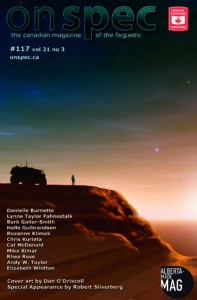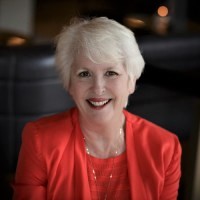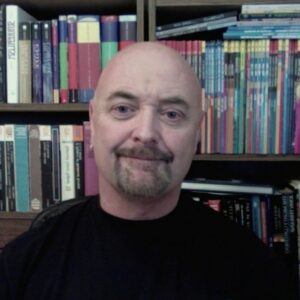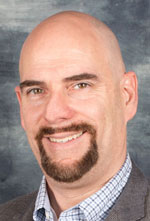SF Canada is pleased to share a new interview from Derek Newman-Stille. They spoke with fellow SF Canada member Mark Leslie (Lefebvre) on subjects ranging from researching werewolf books to spending the night in a haunted hotel room.
Interview with Mark Leslie (Lefebvre) on Writing Werewolves and Haunted Houses
By Derek Newman-Stille
Derek Newman-Stille: “To begin our interview, could you tell readers a little bit about yourself?”
Mark Leslie (Lefebvre): “I’m a writer, editor, bookseller, storyteller with about twenty-five or so books out there in the world. I tend to drift toward the darker realms of speculative fiction in my writing; and most of my non-fiction books are explorations of haunted locations. I have also written a few books about the business of writing and publishing under my full name, tacking “Lefebvre” back on.
I started writing when I was about fourteen years old, received my first rejection at the age of fifteen, and have, of course, collected thousands of rejections since then. My first short story was published in 1992, the same year I started working in bookselling. I’ve grown up within the industry learning about both the author side and the book industry side of things, which I believe has afforded me a unique perspective over the years.
Because I wear many different hats in the roles I’ve played over the years, I often find that the term “Book Nerd” fits quite nicely.”
Derek: “I like that term “Book Nerd”. That is fantastic. You have published in a lot of genres and even extended from Speculative Fiction writing into non-fiction explorations of haunted narratives. Do you find that your explorations of stories about hauntings influences your Speculative Fiction?”
Mark: “Oh yeah, for sure. It’s difficult to turn off the speculative fiction writer mind when I’m doing research for haunted locations. Several of my fictional pieces have been inspired by some of the ghost walks, tours, and reading I’ve done to learn about haunted locations.
That’s the beauty of writing both fiction and non-fiction. I can be doing research on a location that I’m writing about for one of my “true ghost story” books, and something within the stories I’m learning about trigger a thought or an additional “what if?” that inspires me to imagine something. Riffing on true tales is a great source for my writing. Of course, almost everything I experience is prime to be plucked for my writing at one time or another.”
Derek: “I like that inspiration of the “what if”. Do you find that your work is often inspired by the “what if” question and what are some situations where you have asked yourself “what if” and it has planted the seeds of a new story?”
Mark: “If I stop to think about it, “What if?” is likely the most common underlying fundamental of most of what flows from my pen. And not just for the fantastical tales where I inject speculation and wonder; but even for my non-fiction.
It’s easy to see where I took research or something I saw or heard and then went off in a specific “what if” direction.
 For example, my Canadian Werewolf stories and novels came from wondering what it might be like to be living in a large metropolis while suffering from lycanthropy. How would a werewolf have to organize his time? What are the logistics involved when one wakes up from a night of howling at the moon and needs to find clothes to get back home? Those questions birthed the novel A Canadian Werewolf in New York.
For example, my Canadian Werewolf stories and novels came from wondering what it might be like to be living in a large metropolis while suffering from lycanthropy. How would a werewolf have to organize his time? What are the logistics involved when one wakes up from a night of howling at the moon and needs to find clothes to get back home? Those questions birthed the novel A Canadian Werewolf in New York.
Some of my ghost stories were also based on wondering odd things, such as: if objects can be haunted, what might happen if a collector of haunted objects thrust a bunch of haunted items into a personal at home museum. Would these ghosts, now forced to share the same space, act like children forced to share a bedroom?
I think many of my speculative musings often involve dark humour.
One of my most popular stories to read in front of an audience, “That Old Silk Hat They Found” was born from wondering what might ACTUALLY happen if a snowman came alive.
An example from non-fiction might be when I’m researching to write about haunted locations, I approach the research with an open-minded skepticism. I’m a believer, but I also look for plausible explanations for different alleged hauntings. But there’s always a part of me that clings to the “what if this there actually is a ghost? And what if the ghost is this historic figure? And what if….” etc etc.”
Derek: “I can imagine looking out on the world of 2020 and now 2021 there must be a lot of “what if” material to inspire you. How has this past year inspired your writing? What narratives do you see potentially arising from the events of this year?”
Mark: “Interesting question.
I haven’t done a lot of fiction writing about the events of the past year or so, but I imagine that there will be things that will subconsciously inject themselves into my writing. For stories I’ve written in that time period, I’ve purposely avoided pandemic or anything associated with it.
I have incorporated some of the modern political landscape into a novel in progress that’s coming out in February 2021. FEAR AND LONGING IN LOS ANGELES, the latest in my “Canadian Werewolf” series, involves the rise of a terrorist neo-nazi group. Interestingly, that premise was scripted back in 2016. The manuscript was put aside until late in 2020 when I started working on it again, and surprised myself that those elements were in there.
One of the things that the global pandemic, lockdown, and all the accompany elements have done for me, is inspired me to re-engage with other forms of entertainment, and storytelling; especially parody.
I’ve long enjoyed writing parody lyrics to pop songs, and often used that as a writing warm-up activity. But the pandemic and lockdown inspired me and my partner to collaborate on a few pandemic parody videos, where we recorded the song and created a video.
Two of those were “Stuck in This House Here With You” (a parody of “Stuck in the Middle with You” by Stealers Wheel. And then we followed that up with a K-Tel commercial parody, which was a collection of short pandemic-themed parody song clips, including “Sharing Broadband Streams” which was a parody of the Kenny Rogers and Dolly Parton song “Islands in the Stream.”
If I were to look for positives in the current global situation, I think it would be that it was a reminder to me that I am a born storyteller, regardless of the media it comes out in.”
Derek: “You have mentioned your Canadian Werewolf stories and I am really looking forward to reading them. I used to teach a werewolf course at Trent University, so the werewolf is something that I am incredibly fascinated by. What inspired your interest in the figure of the werewolf?”
Mark: “It’s funny because for the longest time I tried to avoid writing using the “classic” monsters of horror like vampires and werewolves, because so much had already been done with them.
But it was reading the guidelines for an open anthology call that inspired my “Canadian Werewolf.” The editor had been looking for stories about the human side of a “monster” and that’s what sparked me to think about what it might be like for the human living in a big city and trying to engage in a normal life despite this hiccough.
With his affliction, he has no memory or conscious control of the wolf. So when he wakes up, he has no idea where he is or what he was up to. That premise was intriguing me, as my main character writes in his first tale, upon waking up naked in Battery Park with a bullet hole in his leg, the taste of human blood in his mouth and no memory of the night before and says: “What the hell had I been up to this time?”
I ended up giving my human wolf-inspired enhanced senses; modelling them off of Wolverine and Daredevil from the Marvel comic books. Of course, my character, Michael Andrews, was, himself (like me) a huge fan of Spider-Man, and therefore adopts a “great power/great responsibility” moral compass that guides him along. He can’t help but use his powers to stop and help others, even when he’s in the middle of some personal desire or goal.
I also had a lot of fun playing with the concept of alpha dog, or alpha wolf. Because, while, as a wolf, he might be the alpha, he is definitely a beta human, or a bit of a pushover. I played up the polite, Canadian stereotype in his character, as well as my own naive nature of having grown up in a really small town in Northern Ontario.”
Derek: “The werewolf is such a fascinating figure because it occupies that space of being both human… and not human at the same time. It opens up so many possibilities for being an outsider who is also an insider. I find it interesting that you set your story in the United States. Was this at all inspired by the insider/outsider quality?”
Mark: “Oh, that’s a great question.
Funny, I set it in the US because when I wrote the first short story that eventually turned into the novel, I had visited New York City for the first time. I was fascinated with how such a larger city as New York could be so urban, and yet have unique natural landscapes in so many neighbourhoods.
I was also fascinated at how the neighbourhoods themselves were so interesting and dynamic, and could each have their own distinct feel of “home” and comfort despite being part of this bustling city that never sleeps.
I only played up the insider/outside qualities as an after-thought, rather than as a fore-thought. I didn’t realize Michael was a beta human until an early reader of the manuscript complained that an “alpha wolf” would never drop onto his knees and sob in front of the woman he loved and lost. When I reflected on that, I knew that would be part of what made him unique, and allowed me to use that alpha/beta contrast. Perhaps this is a similar contrast to Michael being a small town country bumpkin making his way in the Big Apple.
And now that you mention it, I’m starting to reflect on the first person narrative where Michael (who happens to be a writer), is very reflective on making note of observing specific things about his situation and the people around him.
For example, he recognizes that wolves do not kill for sport, like humans; they only kill for food, or over protecting their pack or territory. Humans are a far more frightening creature, when you think about it.”
Derek: “Speaking of the supernatural, I have to ask about some of your nonfiction work on hauntings. What inspired you to start researching and publishing about hauntings?”
Mark: “I blame historic ghost walks. I fell in love with history through ghost walks in Ottawa and Hamilton, ON. And, prior to that, I enjoyed history about as much as I enjoyed walking golf. I mean I put it right up there with watching paint dry.
But going on a tour and learning about local and Canadian history from a guide who was dressed in Victorian garb and carrying a lantern brought such a uniqueness and immediacy to the experience that I realized that we walk upon lands that are rich with history, rich with the tales of those who came before us.
It was shortly after moving to Hamilton and going on several of the local ghosts walks that I was inspired to want to capture some of these tales and share them. I learned that Dundurn, Canada’s largest independent publisher, had always wanted to publish a book of ghost stories about Hamilton. I did some research, leaned there had never been such a thing — ie, there was a hole in the market — spoke with the folks offering the tours about the idea of a book, and they gave me full access to their research and archives, and the rest was history.
I pitched the book, Dundurn sent me a contract, and I set about writing it.
I’ve since written other books based on looking at potential holes in the market combined with locals and subjects I’m interested in. So I’ve covered cities I’ve lived in (Hamilton, Sudbury, Ottawa), cities I love (Montreal), as well as other locations (haunted bookstores and libraries, haunted hospitals).”
Derek: Do you visit the spaces where people report ghost stories and, if so, what is that experience like?
Mark: “Yes, I do, whenever possible, visit the spaces. Ideally when I’m researching and writing them. Sometimes, though, it’s after I’ve already written about them.
I’m actually a big chicken, so I’m often quite nervous visiting such locations.
Though I’ve never had anything paranormal or something I can’t explain happen to be when doing that research, I’m still quite the chicken.
I typically marvel at the history of a specific locale, even if it’s not at the ghosts or hauntings the place is known for.
But I do often approach such visits with a sense of quiet respect and honour. Often times the location is the site of some horrific tragedy or murder, and I sometimes feel as if I’m visiting a grave.
So there can be a great deal of high emotions that come with visiting particular locations. Fear, excitement, quiet reflection, sadness.”
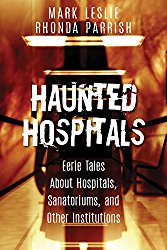 Derek: “I recently got a copy of Haunted Hospitals that you published with Rhonda Parrish and I was wondering what got you fascinated with hospitals as particular spaces of haunting. They strike me as places that are already uncomfortable for people. Do you think that this discomfort and the uncertainty around life and death may inspire people to create ghost stories about them? Or is the fraught nature of these spaces a possible reason why ghosts linger?”
Derek: “I recently got a copy of Haunted Hospitals that you published with Rhonda Parrish and I was wondering what got you fascinated with hospitals as particular spaces of haunting. They strike me as places that are already uncomfortable for people. Do you think that this discomfort and the uncertainty around life and death may inspire people to create ghost stories about them? Or is the fraught nature of these spaces a possible reason why ghosts linger?”
Mark: “Great question.
Hospitals, are, in an of themselves, a place where people come and go out of the world, where all kinds of the heights and depths of human experience happen. Even if you don’t believe in ghosts or spirits or supernatural elements, you can’t help by marvel at the power that a location like a hospital holds.
There were plenty of doctors and nurses who had been willing to share tales about inexplicable experiences they had at the hospital where they worked, but when it came time to me asking permission to use these stories (even if I were to make them anonymous), they declined. While slightly disappointed, I also completely understood their decisions, and saw it as a sign of respect they held for their colleagues, patients, and perhaps also the previous tenants of the buildings where they work.
I also found it fascinating that, when you go back in history, there was this odd blurry line between hospital, and asylum, and prison. In some cases, like in terms of Canada’s oldest jail, you had pickpockets and murderers sharing the same space with folks who needed to be hospitalized for a mental disorder. In much of the research I did, there plenty of elements of a “hell on earth” environment for many of the downtrodden and less fortune of society.
But considering the depths of horror, the extremes of emotions, wouldn’t hospitals be a spot that is rife for either hauntings or at the very least some sort of echo of the intense energy and emotions experienced there?”
Derek: “You know I have to ask – have you seen any ghosts or do you have any personal haunting stories that you are comfortable sharing here?”
Mark: “It’s funny that you ask that. For years, whenever I was asked this question I would be able to laugh and say. “Nope. Good news is that I’ve never seen a ghost or experienced anything paranormal. But I still believe in ghosts. I mean, I don’t have to have seen an atom myself to believe in them.”
But I can’t say that any more.
A few years ago, my partner Liz and I were traveling back home from a work related trip to Orlando where I had to speak at a writer’s conference. We decided to take some extra time and drive, exploring different hiking spots and breweries along the way. (We are also still researching to write a book about haunted bars and breweries, so that was part of the trip).
But on our way back, we planned a stop in Weston, West Virginia at the Trans Alleghany Lunatic Asulym. That appears in the book Haunted Hospitals, and this was about a month after the book was released. This was a case where I visited the spot AFTER having written about it. In fact, this was a chapter that Rhonda wrote, so I wasn’t as intimately familiar with it as she was.
But the night before, we arrived in town on a foggy night around midnight, and had been driving all day, having left Orlando in the morning. The first hotel we stopped in at was full. No rooms left. So we went down the highway to the next one. Liz was driving, so I ran in.
They had a single room. “But,” the clerk said. “It’s two double beds. No Queen. No King.”
“That’s fine,” I said. We just needed a place to drop into sleep, get up in the morning and go on the tour of the local historic haunted building, and then head back home.
We went to bed immediately. Liz took the bed closest to the washroom, and I took the one nearest the door. She had a hoodie on, threw it over her head and fell fast asleep.
It always takes me longer to fall asleep, and, because I’m a big chicken, if often takes a bit longer in a strange hotel room, despite being tired.
But I finally fell asleep.
I woke, some time later, to the sound of Liz getting out of bed and shuffling to the bathroom. I cracked an eye open to see her moving past the end of her bed toward the washroom, listening to the shuffling of her feet on the carpet.
I laid there waiting for her to turn on the bathroom light. But it never went on.
Then I heard something in the bed beside me. The sound of her breathing in her sleep.
“What the hell?” I whispered, sitting up. There was a woman in our room!
I looked at the door, saw that the security bolt was still latched.
How was that? How did she get in?
I looked over at Liz, she was sleeping in the bed beside mine.
I figured I must have likely fallen asleep after seeing her move to the bathroom, then woke up a few minutes later, thinking only seconds had passed; and that explained what I thought I’d seen.
I eventually convinced myself my imagination was running overtime and fell back asleep.
Only to be woken again to the sound of something clacking on the table at the end of my bed where my laptop bag and our passports were.
I sat up again. There was something in our room! A thief, maybe, trying to steal our passports, my laptop!
Again, there was nobody there. Liz was still fast asleep.
It took me longer to fall asleep the second time. But I did.
In the morning, I asked Liz if she’d gotten up at all during the night. She said, NO, she had slept through pretty much the whole night. I then said: “Wow, because here’s what I thought I saw and heard last night.”
I relayed the story to her, and her face went extremely pale.
Liz is not a believer in ghosts. She’s fascinated by the tales, but unlike me, she doesn’t believe.
The look on her face told me she was having second thoughts.
“What? What is it?” I asked.
“Well,” she said. “I wasn’t going to say anything because I thought maybe it was a dream, but here’s what happened to me last night.”
She relayed that she had been asleep, facing the wall, when she felt a presence standing over her. She knew it wasn’t me, the way a person just knows. And then she felt a hand press onto her shoulder; it felt like a woman’s hand. Because she is a feisty person, the alpha in our relationship, she steeled herself up to spin around and punch the stranger standing over her in our hotel room.
But when she spun, there was nobody there.
In a nutshell, we both felt the presence of a woman in the room with us in different ways.
It was a bit eerie. But not scary. She was just a presence. So we made sure to wish her well and say good bye to her when we left.
Then we went to one of the most notoriously haunted asylum in that part of the country, and didn’t see a single ghost or unexplained activity.
But I suppose I can no longer say that I’ve never seen a ghost; or, at least, some sort of thing that I can’t properly explain.”
Derek: “What is it like to interview people about their experiences of hauntings?”
Mark: “Interviewing people about ghosts and hauntings is quite interesting.
In some cases, they are excited to share some unique and thrilling experience. In other cases, they are sharing something profoundly emotional and disturbing.
I find that it’s important for me to tread cautiously and respectfully as much as possible.
They might also be dealing with worries over being made fun or or not believed, so there’s that element too.
Also, I always ensure that those who share their stories have the option of me changing their name and identity.
I also realized that I can’t always just take the story that people share with me. Even true stories need to have some sort of story arc. So I’ll often write down their story and then, when I write the tale out, I’ll elaborate and flesh out the story with additional details that make sense based on my research and the setting, even if it wasn’t part of their original tale.
And then I usually share that chapter with them after the fact to ensure I’ve capture the details accurately, and respectfully.
In some cases, I’ve had stories I’ve written where I really had to elaborate and injected my version of what I thought the dialogue might have been (where the person sharing the story didn’t give “line by line” dialogue explanations) – I merely fleshed out the story with what I felt would be realistic elements.
Most of the time, they’ll come back with a “wow, it was like you were right there!” response, suggesting I managed to flesh out just enough detail to be close or accurate or authentic about the experience.
Because it’s that type of authenticity that I believe resonates with the reader.”
Derek: “Having done a few ghost tours of cities and being someone who is passionate about history, I have always found it fascinating the way that ghost stories are often ways of beginning narratives talking about the history of a particular location. Do you find that the narratives you record inspire you and your readers to learn more about local history?”
Mark: “Oh yes. One hundred percent.
While I started off not being interested in history at all, it was through my exploration of ghost stories that I learned to love history. In fact, when I visit new locations, I look for historic tours so I can learn more about the locale, the people, the buildings, the architecture, the culture, all of it, even if there aren’t any ghost stories to share.
I’ve heard from readers who said that one of the elements in my ghost stories have intrigued them enough to continue to do research on a thing I perhaps only touched upon, because in a ghost story book, you have to stick to the chills and thrills.
When I was writing Tomes of Terror: Haunted Bookstores and Libraries, the book nerd in me often took over (I think he and I share this same body in a lycanthropic manner) and went whole hog writing about the history of various bookstores and library locations. My editor and I actually fought over how MUCH detail I wanted to inject. She reminded me that people were there with a willing suspension of disbelief to read about ghosts, and I was harping on about bookish history. We finally compromised, and I cut a significant amount of that out of the chapters, but managed to get some of it back into the book in these little side-bar segments that appear in some chapters. That way, the true believer ghost lovers would still enjoy the chapter, and the bookish folks like me could dig into and enjoy the in depth book history insights.”
Derek: “Thank you for a brilliant interview and for sharing so much with us. As we finish the interview, is there anything you want to mention here or any current projects you want to let us know about?”
Mark: “Thank, you, Derek, for a fun chat.
I appreciate the conversation, and the only other thing I’d add is that if people wanted to find out more about me, or check out the various things I’m up to www.markleslie.ca has info, links to my books, and all my exploits on social media. Thank you!”
Mark Leslie (Lefebvre) has been writing since he was thirteen years old and discovered his mother’s Underwood typewriter collecting dust in a closet. Under the name Mark Leslie, he has published more than a dozen full length books. He pens a series of non-fiction paranormal explorations for Dundurn, Canada’s largest independent publisher. He also writes fiction (typically thrillers and horror) and edits fiction anthologies, most recently as a regular editor for the WMG Publishing Fiction River anthology series.
Between 2011 and 2017, Mark worked at the Director of Self-Publishing and Author Relations for Kobo where he was the driving force behind the creation of Kobo Writing Life, a free and easy to use author/small-publisher friendly platform designed to publish directly to Kobo’s global catalog in 190 countries. Mark has spoken professionally in the United States and Canada, in the UK and across Europe, specializing in advances in digital publishing and the vast and incredible opportunities that exist for writers and publishers.
Derek Newman-Stille, MA, PhD ABD (They/Them) is a Disabled, Queer, Nonbinary activist, author, artist, academic, and editor. They edited the anthologies Over the Rainbow: Folk and Fairy Tales from the Margins (Exile) and We Shall Be Monsters (Renaissance Press) and are the 8 time Prix Aurora Award-winning creator of the digital humanities hub Speculating Canada. Derek has published in fora such as Uncanny Magazine, The Playground of Lost Toys, Quill & Quire, Fireside Magazine, Diamond Book Shelf, The Town Crier, Exile Quarterly, and Nothing Without Us. Derek’s art work has been published in fora such as Feminist Space Camp, Lackington’s, Postscripts to Darkness, and Aging Activisms.




